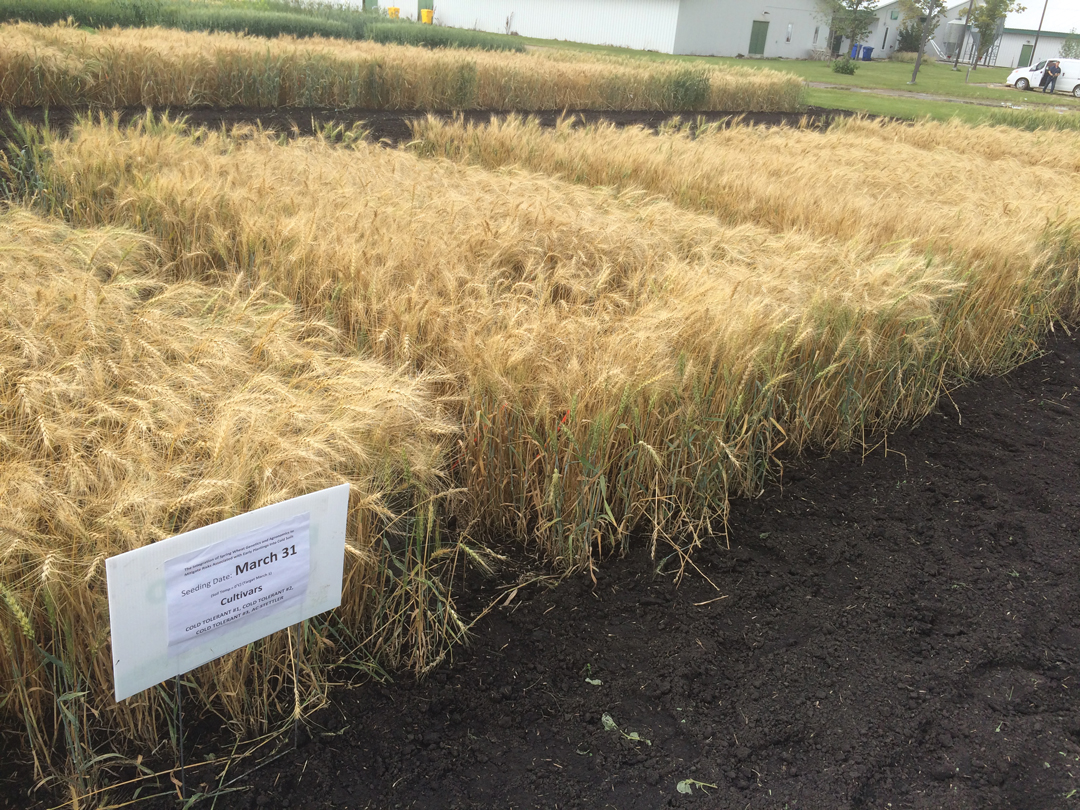MALT MATTERS
BY KARA BARNES • PHOTOGRAPHY BY ELECTRIC UMBRELLA
Lorelle Selinger is the canadian barley supply chain manager for Prairie Malt Limited (PML) and Cargill Malt. A farm girl from Holdfast, SK, she studied agricultural economics at the University of Saskatchewan prior to working in the Biggar and Loreburn elevators for the Saskatchewan Wheat Pool. Switching gears in the late 1990s, Selinger moved to Winnipeg, MB, and traded grain for the Canadian Wheat Board. In 2012, she started her current role at PML, commuting between Winnipeg, Biggar, SK and Spiritwood, North Dakota.
Selinger is secretary of the Canadian Malting Barley Technical Centre board of directors and president of the Manitoba Master Brewers Association. She represents the Canadian malting industry on the Canadian Grain Commission’s Western Standards Committee, and was a member of the working group that established the Barley Council of Canada. She is a strong believer that a co-operative value chain is necessary for the success and advancement of the malt industry. At PML, a mid-size facility capable of processing more than 100,000 tonnes of malt annually, Selinger ensures the plant has enough quality malt for the entire year, as well as oversees the origins of Canadian barley for the Cargill plant in Spiritwood, ND. A true people person, Selinger makes certain growers are on programs that work for them and the maltster, giving brewing customers a top-notch product for their brewing needs.
GrainsWest: What got you interested in a career in agriculture?
Selinger: I grew up on a mixed farm—grain and cattle—and my dad worked for John Deere. When I first got to university, I thought I would be into animal nutrition and veterinary medicine, but quickly learned my interest was on the business side of agriculture. I ended up in barley because an opportunity came up to be the Canadian Wheat Board barley trader, and I worked there until this job at Cargill Malt came up. I liked trading and the excitement of negotiation, but at the same time I’m a country girl and always enjoyed working with farmers.
GW: Can you give us an overview of Prairie Malt Limited?
Selinger: We take premium barley grown in Western Canada and process it into a product that can be used for brewing. This requires a wide range of people from highly educated scientists who have the chemistry knowledge to produce the actual malt, to people with a good understanding of barley and how it will react to different things, to hands-on floor staff for very labour-intensive physical work. Malt production is mainly from Metcalfe barley with smaller amounts of the Copeland and Meredith varieties, in addition to our own variety, PolarStar.
GW: How are the Canadian and American malt markets different?
Selinger: Overall, they are very similar. They are driven by the same kind of demand, though the U.S. has always been an open market environment. More production is contract-grown in the U.S., though Canada is moving that way, and nearly half of the barley acres in the U.S. are under irrigation so variability is much lower.
GW: What is the malting business like right now?
Selinger: Overall demand for malt has been steady over the past few years. Demand in North America for mainstream beers has remained consistent or slightly declined, but demand for craft beers has grown, so it’s kind of balanced out for us. Barley acres have gone down, which is a concern, but we have a lot of very good growers who continue to produce year after year. There is still enough barley grown, but it’s more difficult in years with quality concerns. We are struggling a bit right now with capacity and the handling system, but so is the rest of the industry.
GW: You mentioned the craft brewing industry has grown in recent years. Has this had an impact on PML?
Selinger: It definitely has. Typically, craft beers use higher malt content, so it’s positive in that sense and it provides another market option. Craft brewers are looking for smaller volumes, so they may be more flexible, but they still have certain types of beer they want to make so they have certain needs. A balanced portfolio of big and small customers that want certain specs is beneficial for us as it helps balance risk.
GW: What’s the biggest challenge
you face?
Selinger: Personally, it’s the ever-changing nature of the industry. Barley prices used to be established and provided to us as buyers by the Canadian Wheat Board. Now we have to set the price for growers, and without an established futures market it has been a learning curve in how to establish those prices. There has been consolidation of a lot of the major grain players, and changes in the agronomy and crops that are produced in the growing region. Ten years ago we didn’t have soybeans to compete with, now we do. You have to evolve to what’s current.
For the malt houses, it’s getting consistent-quality barley because every year there is something different and you have to change your whole process to adjust to that. Malting uses lots of water and power, so fluctuations in those costs also have an effect on us.
GW: Your job focuses on the supply chain, interacting with both growers and brewers—how do you see your role in the industry now and in the future?
Selinger: The big thing we’ll see for my role is that it’s going to become more common. There is no longer segregation between the barley people and the malt people—it’s become a team effort. My job has evolved into exactly that: I work not just with barley producers but with customers to produce the malt they need. We’ve gone back to a grassroots type of thing where it’s really important to have full traceability across the production system.
It’s fair to say PML has a true belief that barley isn’t a commodity. It’s a speciality product and needs to be treated as such. There is a need to be involved in the whole industry to understand that and move it in that direction.
GW: What is it like developing and maintaining relationships with local malt growers?
Selinger: I have a barley supply-chain team whose objective is to get out and introduce companies to growers. We meet with growers to ensure all their needs are met, and provide agronomic and varietal information on what to grow. Personally, I provide information on price and the look of markets, and work with growers to ensure their contracts meet their needs and our needs. We attend farm shows across the Prairies to meet new farmers.
GW: What sets PML apart from other maltsters?
Selinger: Our attention to detail. We are a very quality-conscious malt house; we have always promoted good practices on the farm and full traceability of where products come from. We have the ability to have end-use customers meet directly with growers, to visit the farms and see the equipment. The key to our success is strong relationships with both growers and end-use customers. Obviously we have a lot of competition, but we work very hard to have personal relationships and understand client needs beyond just a commodity.
GW: What do you enjoy most about working in the industry?
Selinger: The people. I’ve had the opportunity to travel all over the world, meeting different people and experiencing different cultures, and I realize we all have something in common—we all need agricultural commodities.








Comments